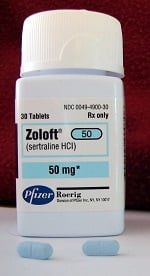 Just weeks after winning the first case to go to trial that accused Pfizer of hiding birth defect risks for the children of women who took the antidepressant Zoloft during pregnancy, the pharma giant has again convinced a jury that there was no credible connection. The results are positive for Pfizer ($PFE), but the company still faces more than 1,000 lawsuits alleging similar claims.
Just weeks after winning the first case to go to trial that accused Pfizer of hiding birth defect risks for the children of women who took the antidepressant Zoloft during pregnancy, the pharma giant has again convinced a jury that there was no credible connection. The results are positive for Pfizer ($PFE), but the company still faces more than 1,000 lawsuits alleging similar claims.
The decision was reached by a jury in a state case tried in Philadelphia brought by on behalf of Mia Robinson, Thomson Reuters reports. Robison was born with a heart defect that it was alleged stemmed from her mother using Zoloft during pregnancy. The jury this week heard evidence that a Pfizer scientist had warned executives there might be a link between the antidepressant med Zoloft and birth defects.
A 1988 report was also put into evidence that showed that company researchers found more than a dozen side-effect reports about birth defects, and concluded that Zoloft couldn't be ruled out as a cause. Pfizer has contended that it has always kept the FDA and the public apprised of safety issues associated with Zoloft. The drug's official label cautions against its use during pregnancy, the company says. Pfizer argued at trial that the documents had been cherry-picked and did not reflect the bigger picture.
The class of drug to which Zoloft belongs has been accused in lawsuits before of being linked to birth defects. In 2010, GlaxoSmithKline ($GSK) paid more than $1 billion to settle hundreds of lawsuits alleging its antidepressant drug Paxil increased the risk of birth defects. Paxil and Zoloft are two drugs in the class of depression-fighters known as selective serotonin reuptake inhibitors, or SSRIs.
In April a jury found in Pfizer's favor in the case of 11-year-old Logyn Pesante, whose family was asking for $2.7 million in compensation for his myriad health problems, including heart defects, which were treated with three expensive surgeries.
- here's the Thomson Reuters report